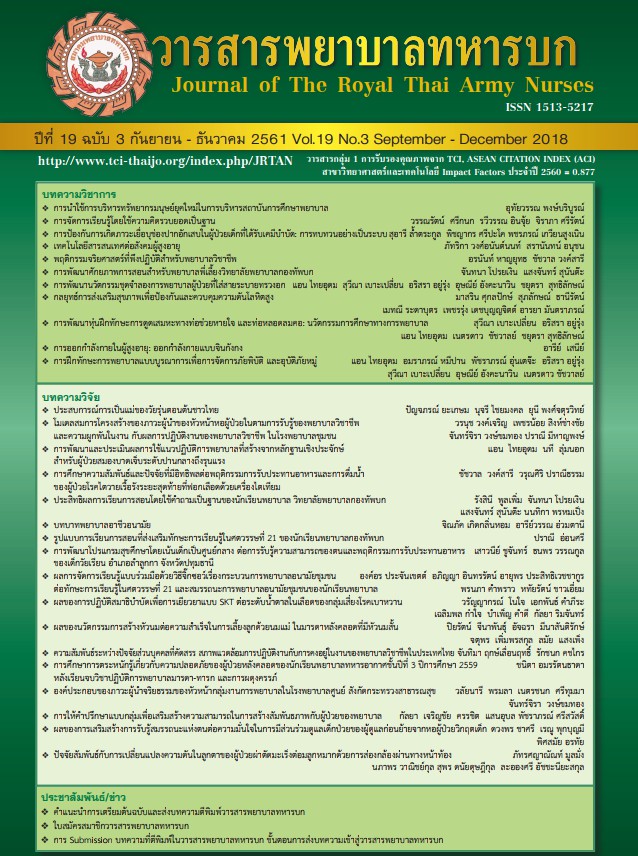Effectiveness of Question Based Learning of nursing students at The Royal Thai Army Nursing College
Keywords:
Question based Learning, Nursing students, The effectiveness of Question Based LearningAbstract
Abstract The purpose of this classroom research was to study the effectiveness of question based learning of nursing students at The Royal Thai Army Nursing College. The sample size was calculated by table of Krejcie & Morgan, 1970. The sample comprised of 85 the third year nursing students of the academic year 2018, who volunteered to join in this research. The tools of this research were questionnaires which were composed of learning behaviors, satisfaction of students and instructors during learning by using question based learning method and the test. Questionnaires were approved by 3 experts of nursing education. The test were approved by 3 nursing instructors from the obstetrics nursing department and 2 midwifes from Phramongkutklao hospital. The reliability of the test was .65 using KR-20. The findings of this research were as follow : 1. All writing summary of learning after classes passed the objective of learning. All students passed the test of the learning criterion at 60% and the average score was 71.16% 2. Learning behavior scores of students during classes by using question based learning was in high level. ( = 2.84 from 3.00) 3. Both students and instructors expressed a highest level of satisfaction of Learning activities by using the question based learning. ( = 4.48 and 4.53 from 5.00)
Downloads
References
2. Knowledge Network Institute of Thailand. Learning and the brain. Bangkok : Best graphic press, 2008. (In Thai).
3. Samianpet T.and Kusol K. The Questioning Skills in PBL Learnig Method of the Second Year Nursing Students, Bachelor of Nursing Science. Journal of Nursing Education. 2008,1 (3) : 2-14. (In Thai).
4. Mongkonwanit P. Policy of Learning management of Question Based Learning . Question Based Learning. Bangkok : SiamTechnology College, 2014. (In Thai).
5. Tosuksri W. Clinical Teaching : Questioning in Clinical teaching of medical nursing. Knowledge Management. Bangkok : Nursing Department, Mahidol University, 2010. (In Thai).
6. Wiwatjarernwong C. The Effect of Questioning method on Students Learning Outcome in Principles of Accounting 2. Thesis (Education Development) : Sripatum University, 2009. (In Thai).
7. Somsuk M., Muangpatom C. and Jansrisukot J. The Effect of Historical Method and Questioning Technique on Analytical thinking Ability and Achievement in Historical Subject of Mathayomsuksa 2 Students. Graduate Research Conference 2013. Khon Koen University, 2013 : 1286-1294. (In Thai).
8. Rungroj K. The Development of the English skill activities package through the Questioning Technique for students in grade six. Thesis M.Ed. (Curriculum and Instruction). Chanthaburi : Rambhai Barni Rajabhat University, 2013. (In Thai).
9. Chinanawin C. A comparative study of Learning method, Question-Answer method and Review and questioning method. Social Sciences Journal. 2014, 4(2), p 69-81. (In Thai).
10. Bloom, Benjamin S. Human Characteristics and School Learning. New York : McGraw Hill, 1976.
11. Thaharawanit A. The Study of Problem of non answering questions in class in working Improvement Subject by Empowerment self-esteem of Students. Thesis (Curriculum and Instruction) : Suan Dusit Rajabhat University, 2008. (In Thai).
12. Tongpan S, Udom P. and Tepnual T. The Results of Inquiry Teaching Method with Questioning Technique on Critical Thinking Abilities and Science Learning Achievement of Prathomsuksa 5 Students. Academic Service Journal. 2009, 20(1) : 57-66. (In Thai).
Downloads
Published
How to Cite
Issue
Section
License
บทความหรือข้อคิดเห็นใดใดที่ปรากฏในวารสารพยาบาลทหารบกเป็นวรรณกรรมของผู้เขียน ซึ่งบรรณาธิการหรือสมาคมพยาบาลทหารบก ไม่จำเป็นต้องเห็นด้วย
บทความที่ได้รับการตีพิมพ์เป็นลิขสิทธิ์ของวารสารพยาบาลทหารบก
The ideas and opinions expressed in the Journal of The Royal Thai Army Nurses are those of the authors and not necessarily those
of the editor or Royal Thai Army Nurses Association.






